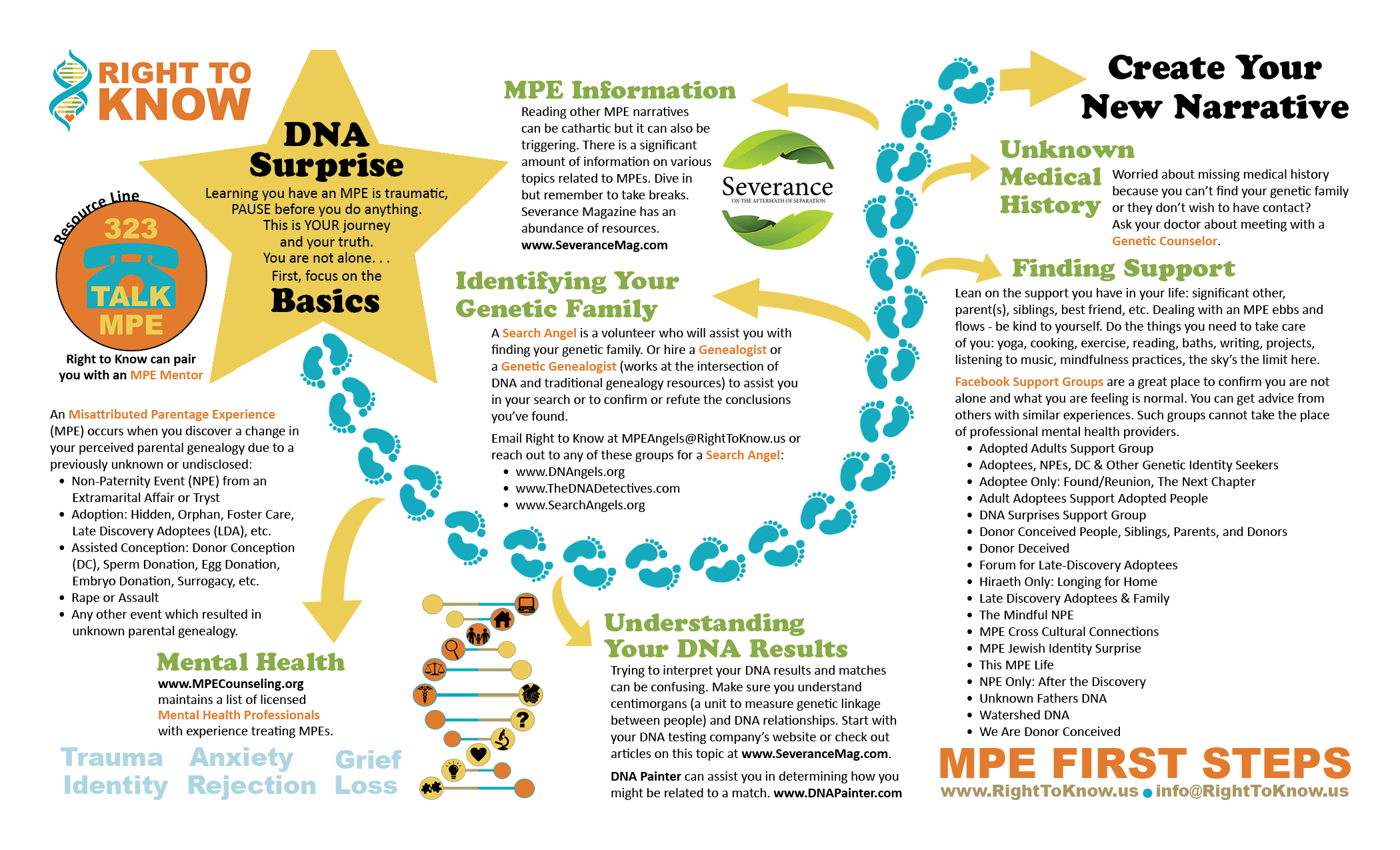Your thoughts are racing in a million directions and you're not sure what to do next. First slow down ... way down.
Maybe you took a DNA test for fun and the results turned out to be anything but. You don’t recognize anyone in your match list or you find in your mailbox a “Hi, we’re siblings!” message when you thought you were an only child. Or perhaps someone let slip a family secret and now you suspect that you have no genetic connection to one or both of your parents. What should you do now? The simplest and yet most difficult way to regain your equilibrium after being blown away is to hit the pause button.
First, Put on the Brakes
It may feel as if your world has gone sideways. It wouldn’t be surprising if you can’t think straight and your mind is reeling; after all, this may be the most life-changing experience you’ll ever know. You may want to try to right your world immediately, but a better strategy is to acknowledge that you’ve had a significant shock and let it settle in a little before reacting. The initial revelation of family secrets may just be the first wave in a storm of shocks and struggles, so the way you respond early on may ease your way throughout your journey. Later you can think about your goals and explore how to move forward, but for now, take it slowly. (See the First Steps Guide from Right to Know below.)
Renowned neurologist and psychologist Viktor Frankl often is credited for a wise statement likely first made before he was born: “Between stimulus and response there is a space. In that space is our power to choose our response. In our response lies our growth and our freedom.” Take time to be still in that space. “It’s definitely a good idea to stop and take a breath,” says psychologist Greg Markway. “Part of your ‘story’ changes the moment you get this new information, but you don’t have any of the background information about the story.” Feeling a range of emotions, he says — upset, lost, angry — is normal. “Let yourself feel and accept the feelings.” Give yourself time, he advises, to explore the rest of your story and learn what the new information means.
“Don’t make any life-changing decisions,” advises Krista Driver, PhD, a licensed marriage and family therapist who’s also an NPE (non-parental event or not parent expected). “Don’t sell your home, divorce your mother, quit your job, or make any major changes.” In addition, she says, “Be selective in the people you tell; not everyone is worthy of your story.”
Take a DNA Test
If you haven’t already taken a DNA test, take one now to confirm any suspicions you may have. Use the strategy outlined here.
Commit to Self-Care
Establishing equilibrium after a shock — whether that’s done by searching for biological family, reestablishing peaceful connections with your social family, or resolving that you may never have the answers you seek — is a marathon, not a sprint. It will take energy, stamina, and focus at the same time that it tries to drain you of all three.
It’s well known that in the wake of a shock, the body and mind can take a hit, so make a commitment to guarding your well-being by eating properly, getting enough sleep, and maintaining an exercise routine. And take steps to manage stress and anxiety. Devote some time to whatever you find relaxing — maybe listening to music, spending time in nature, reading, or visiting a museum. One of the best ways to defuse stress, however, is to practice mindfulness-based meditation.
“Mindfulness,” says Markway, “is the process where you focus your attention on the current moment. You also attend to your current thoughts and feelings — just noticing them — without trying to judge or change them.” Load your phone with any one of a number of mindfulness-based meditation apps such as Calm, Omvana, Headspace, or Insight Timer and pause for five or ten minutes twice a day and whenever you’re feeling anxious to slow your mind and still your thoughts. Taking care of yourself,” adds Markway, “helps you think more clearly.”
Another aspect of self-care is pausing for self-reflection. Driver suggests keeping a journal. “This may come in handy when you’re trying to piece it all together later. As people move through this process of discovery, memories will float back that provide confirmations, or they may recall conversations from childhood, and this medium documents the range of emotions that will come up during the journey.”
Find Support
You may feel powerless and alone. You are neither. Information and resources are empowering, and you’ll find those here in the magazine and in numerous references listed in our Resource sections. But before you explore them, make an effort to connect with others who’ve been where you are now. Your friends and family members, unless they’ve had a similar experience, may not be able to understand or relate to the feelings you’re having. Find a community of people who’ve also experienced this kind of shock,” says Driver, who recommends an online support group, or, if you’re lucky enough to live near one, an in-person group. “This helps people know they aren’t alone and provides a safe place to explore potential avenues to take.”
In addition, there are dozens of Facebook groups that may provide comfort. While not true support groups since they’re not moderated by trained professionals, these private groups offer comfort, peer support, and shared resources. Severance has its own group, Adoptees, NPEs, Donor Conceived & Other Genetic Identity Seekers, and there are many more devoted exclusively to adoptees, donor conceived people, NPEs, or late discovery adoptees. (See our Resources pages.)
As you seek support in these ways, ensure that you don’t lose touch with your real-world support group, take time to spend with friends, and engage in whatever activities you found enjoyable or rewarding before you made this life-changing discovery.
Get Help if You Need It
All individuals perceive and react to trauma differently. There’s no right or wrong way. Almost everyone will feel knocked off balance by finding out that a branch of their family tree has fallen. Some manage to take it in stride, and others will feel overwhelmed, devastated. It’s not unusual in the immediate aftermath of a such a discovery to feel angry, sad, moody, and distracted. You might have difficulty concentrating or sleeping. These feelings are normal and likely will subside as you absorb the shock. But if they linger, cause you to engage in risky or troublesome behaviors, or interfere with your daily activities, consider seeking the help of a therapist, preferably one trained in issues related to family separation.

BEFORE YOU GO…
- Please leave a comment below and share your thoughts.
- Let us know what you want to see in Severance. Send a message to bkjax@icloud.com
- Tell us your stories. See guidelines at https://severancemag.com/submission-guidelines/
- If you’re an NPE, adoptee, or donor conceived person; a sibling of someone in one of these groups; or a helping professional (for example, a therapist or genetic genealogist) you’re welcome to join our private Facebook group at https://www.facebook.com/groups/402792990448461
- And like us on Facebook at https://www.facebook.com/severancemag and follow us on Twitter and Instagram @Severancemag


1 comment
New to this. Just found out last year (I’m 65) that my father is not my father. Both parents are deceased and I never had a relationship with my father, him leaving when I was very young. DNA relatives have been aggressive in wanting to meet me (half siblings and cousin). Although I have spoken to one of them, I hired a genealogist to confirm all. I don’t share their enthusiasm, and there is another DNA relative who is daughter to the brother of my DNA father. She died a year or two ago. These guys were busy! I hate this family’s background of being from the south and being slaveholders, and I have a number of 3rd to 5th cousins who are Black. I’m enraged not over having Black relatives. I am enraged over the raping of their mothers. My parents were from New York City. I can never accept the Southern way of thinking.